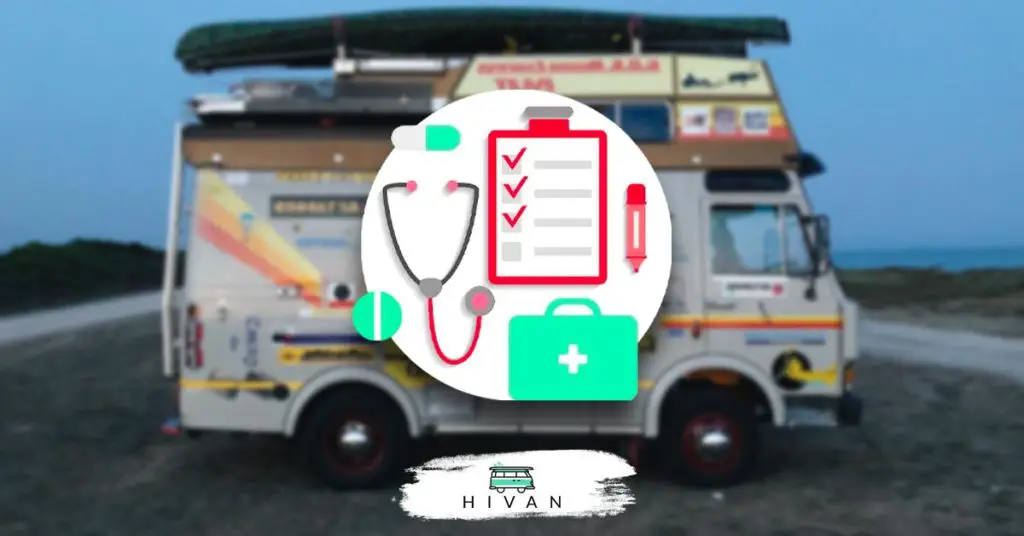Hi-van is supported by its audience. When you purchase using our links, we may earn an affiliate commission (no added cost to you). Learn more
Suppose you wish to live a free and adventurous life you’re in control of and are not being forced into a predetermined pattern set out by society. Then, van life is the alternate lifestyle for you. However, one important consideration for van dwellers is health insurance.
Finding the right health insurance for van life can be a daunting task. With so many options available, it can be difficult to determine which plan will provide the necessary coverage while also fitting within a budget.
Factors such as preexisting medical conditions, travel frequency, and location can all impact the type of coverage needed.
In this article, we will explore the various options available for health insurance for van life and provide guidance on how to choose the best plan for your needs.
Why Health Insurance is Important for Van Life
Van life is an exciting and adventurous lifestyle that allows you to travel and explore new places while living in a van. However, it’s important to remember that accidents and emergencies can happen at any time, and having health insurance can be a crucial safety net for van lifers.

Without health insurance, you could be responsible for paying all of your medical bills out of pocket, which can be extremely expensive and financially devastating. Medical bills can quickly add up, especially if you require emergency care or hospitalization.
In addition to protecting you from the financial burden of medical bills, health insurance can also provide personal liability coverage. This means that if someone is injured on your property or as a result of your actions, your insurance can help cover the costs of their medical bills and any legal fees that may arise.
Having health insurance can also provide peace of mind and allow you to fully enjoy your van life experience without worrying about the financial consequences of an unexpected injury or illness.
In conclusion, health insurance is an important aspect of van life that should not be overlooked. It can provide a safety net in case of emergencies, protect you from the financial burden of medical bills, and provide personal liability coverage. Make sure to research your options and choose a plan that fits your needs and budget.
Factors to Consider When Choosing Health Insurance

If you’ve already decided that van life is the right path for you, then the next thing you need to consider is how to pick suitable health insurance for a van lifer on the road.
There are numerous options when it comes to picking health insurance as a van lifer, but there isn’t a “one shoe fits all” policy that you could opt for, as picking the right plan that covers all your needs could be tricky. Options will be different depending on various criteria, with the most prevalent being your domicile state or state of the primary residence.
The criteria for being eligible for a particular policy could differ greatly from one state to another as regulations, insurance policies, and other factors will determine your premium and the kind of coverage for which you may be eligible.
When comparing policies, one of the most deciding factors in your policy options and premiums is your medical history. People with pre-existing conditions usually have to pay higher premiums or might not even be eligible for some plans.
There are several factors to consider. Here are some of the most important factors:
Income and Budget

One of the first things to consider when choosing health insurance is your income and budget. If you have a low income, you may be eligible for subsidies that can help you afford health insurance. On the other hand, if you have a high income, you may be able to afford a more comprehensive plan with lower deductibles and co-pays.
It’s important to remember that while a high deductible plan may have lower monthly premiums, you’ll have to pay more out of pocket before your insurance starts covering your medical expenses. Make sure you choose a plan that fits your budget and provides the coverage you need.
Domicile State

Another factor to consider is your domicile state. If you’re a full-time van lifer, you may not have a permanent address. In this case, you’ll need to choose a state to establish residency in order to purchase health insurance. Keep in mind that each state has its own rules and regulations when it comes to health insurance.
Health Status and Pre-existing Conditions
Your health status and any pre-existing conditions you have should also be taken into account when choosing health insurance. If you have a chronic condition or need regular medical care, you may want to choose a plan with lower deductibles and co-pays. If you’re generally healthy and don’t need a lot of medical care, a high deductible plan may be a good option.
It’s important to note that under the Affordable Care Act (ACA), insurance companies cannot deny coverage or charge higher premiums based on pre-existing conditions. However, if you’re purchasing insurance outside of the ACA marketplace, you may encounter different rules.
It is important to note that a particular plan is set out for van lifers as life on the move does come with its ups and downs. Whatever insurance policy you’re currently on might not apply when you’re on the road, and you might need a health insurance plan that covers you nationwide.
Your Travel Frequency
This kind of insurance is what most van lifers choose. As the name implies, it provides health coverage on the road. Travel insurance is covered nationwide and is suitable for van lifers traveling long, varying distances with health issues that might spring up at any moment.
The most critical aspect of choosing this type of insurance is determining if you’ll be on the road full-time, part-time, or if you’ll be based out of a particular area for long or short periods, and this determines the policy coverage that will be available to you.
Personal tips: I do use World Nomads and I'm totally satisfied with their services and support. You can check their website here . They have a bunch of useful information regarding traveling and what you need to do in the current country you're in.
World Nomads travel insurance has been designed by travelers for travelers. If you leave home without travel insurance or your policy runs out, you can buy or extend it while on the road.
Types and Policies of Health Insurance
When it comes to van life health insurance, there are several types of plans to choose from. Each plan has its own set of benefits and drawbacks, and the best choice for you will depend on your personal situation. In this section, we’ll take a closer look at the most common types of health insurance plans available to van lifers.
Catastrophic Insurance

This type of insurance is only valid for major, predetermined emergencies, and it doesn’t cover doctor’s visits and prescription refills. This policy might also be contingent on the fact that you are below a certain age bracket or income level and that your current income can only afford you emergency coverage.
If you believe your activities on the road come with a certain level of risk, this insurance policy might be just what you need, provided you’re a relatively healthy, young adult. It has a low monthly fee but does come with high deductibles and only applies for major medical emergencies.
Out-of-Network Care
As a van lifer who is constantly out of range from your home state or primary residence, you would need a policy that applies even when you are “out-of-network”; otherwise, you might need to pay for medical services yourself upon reception.
Out-of-network care would cover nationwide medical services, doctor’s visits, and prescription refills even when you’re out of the state of your primary residence. It is essential to inquire about the nationwide coverage of an out-of-network plan before paying monthly premiums.
Health-Sharing Services

Health-sharing services, also known as health care sharing ministries, are organizations that facilitate sharing of medical expenses among members.
Most people might not have heard of this type of insurance as it is a relatively new policy and is usually done within a community of people. It is basically like a co-op where all members of the policy pool in their monthly premiums, which are to be used on each member should ever the need arise.
But the problem most people find with this policy is that it is almost always faith-based, requiring each member to be a part of a faith or ministry to be eligible to partake in it. Some even go as far as requesting letters or confirmations of your belief from a pastor of your church before you can be allowed into the cooperative.
Additionally, even if you are allowed in, there are numerous cases where the services refuse to pay out medical bills due to one problem or the other.
However, it is used by some van life communities and is worth checking out before you begin any payments. Just be sure you get all the details on the coverage, what types of illnesses and accidents are covered, and what kind of guarantees you’ll have that the money will be there for you when you need it.
Telemedicine or Online Medicine
Telemedicine is suitable for generally healthy people who don’t need to see a doctor in person very often. This kind of health care has been around for years, but it became popular during the COVID-19 pandemic as most people couldn’t leave their homes and apartments to visit a doctor.
This remote medical service is quite affordable, with a monthly fee usually below $50 granting you access to different medical personnel through remote access.
You can have virtual appointments using your phone or computer to discuss symptoms you might be experiencing. The medical personnel can recommend treatment, prescribe medication or refer you to in-person medical care.
For van lifers who travel frequently, it makes seeing a doctor or health official easier and cheaper. It displaces the need to set physical doctor’s appointments while allowing the patient to receive the same medical advice they would receive from a physical appointment.
But this kind of insurance doesn’t cover medical bills if you need to go to the hospital, meaning you would have to pay out-of-pocket bills. It should be used as a supplementary service to other health care plans and not a full-time plan.
The Affordable Health Care Act Health Insurance Plans (ACA)

Otherwise known as Obamacare, the Affordable Care Act could be a good option for full-time Van lifers. The ACA provides minimum coverage plans and preventive care, but it all depends on your domicile state or state of primary residence, Florida being the only exception.
The ACA gives you access to state health insurance exchanges by offering different plans. There could also be a national health exchange option, provided your state permits it. If you choose to opt for a state-sponsored exchange, you must select a plan with nationwide coverage.
In such a situation, prices would greatly vary as plans offered by the ACA could range from high-end plans to minimum catastrophic coverage. Of course, this would all depend on your income and what your state is offering. You may even be eligible for health insurance subsidies if your income falls below a certain level.
The ACA will cover you even with pre-existing medical conditions like diabetes, stroke, heart disease, or cancer. It is government regulated to the point that if you meet your deductible, you won’t be required to pay any more money out-of-pocket for medical bills that may arise.
Supplemental Fixed Indemnity Plans
This plan doesn’t technically count as an insurance plan but can work well in helping offset the number of medical bills. How it works is, you pay a monthly deductible, and in exchange, you receive a fixed cash benefit, including coverage for different medical conditions.
The remarkable aspect of this plan is that it will pay out irrespective of whatever insurance policy you may already have. This means you can use fixed indemnity plans to pay any out-of-pocket expenses that may arise that your regular plan doesn’t cover.
However, this plan is fixed, meaning the amount you receive might not be enough to cover added expenses or bills. Furthermore, this plan doesn’t always cover persons with pre-existing conditions, and you may not be eligible if you meet this criterion.
And while most van lifers use this plan as a supplementary option, others use it as a standalone. If you decide to use this plan as a standalone, you should also set up a health savings account regularly, adding to it to have an added source of money should the bills not be covered by the fixed benefit plan.
Short-Term Health Insurance
This insurance plan is already self-explanatory as it is short-term in nature, but it greatly differs on how short the term it could be. This plan varies from provider to provider as some cases could be as short as six months while others could last up to three years.
Van lifers usually use this plan as a safety net during the transition into life on the road before settling on a more permanent insurance plan later.
It is also perfect for those persons who wish to travel on the road for a while and need a broad coverage insurance plan to secure them. It is quite cheap and is worth looking into if you’re a newbie van lifer.
To sum up, Bearfoot Theory did a great videa about the health insurance and van life, check it out:
A Note on Taxes
/single-word-taxes-on-wooden-block-1132754811-f3ef431cc47a4be3a49223b20774845f.jpg)
It’s important to remember that when picking health insurance as a van lifer, taxes are an essential aspect to look into to avoid being overtaxed on your source of income and your insurance policy.
You may need to know that if you decide to live on the road without health insurance of any kind, you might attract further tax penalties.
And while you may not be fined for not having health insurance in most states, you might want to check the status of whatever state you’re planning on visiting.
Alternative Options for Health Care
When it comes to health care, full-time RVers and van lifers have a few alternative options to consider. These options can provide coverage for medical emergencies, routine check-ups, and unexpected illnesses. Here are a few options to consider:
Faith-based Health Care
Faith-based health care is an option that is gaining popularity among full-time RVers and van lifers. These programs are offered by religious organizations and provide affordable health care coverage to members. Members of these programs pay a monthly fee, which goes towards covering medical expenses. Some faith-based health care programs even cover alternative therapies like acupuncture and chiropractic care.
Health Clinics
Many RV parks and campgrounds have on-site health clinics that provide basic medical care to guests. These clinics are staffed by licensed medical professionals and can provide services like check-ups, vaccinations, and minor medical procedures. Some clinics even offer telehealth services, which allow guests to consult with a doctor remotely.
Telehealth
Telehealth is a convenient and affordable way to access medical care while on the road. This service allows patients to consult with a licensed medical professional remotely, using video conferencing technology. Telehealth services are available 24/7 and can be accessed from anywhere with an internet connection. Many insurance companies offer telehealth services as part of their coverage.
When considering alternative options for health care, it’s important to do your research and choose a program or service that meets your specific needs. Keep in mind that some options may not provide comprehensive coverage, so it’s important to have a plan in place for emergencies.
Overall, there are several alternative options available for full-time RVers and van lifers to access health care while on the road. By exploring these options, you can find a solution that works for you and your lifestyle.
Final Thoughts
Ultimately, choosing van life is dependent on your mindset and resolve, and picking the perfect health insurance policy will have to reflect how you are willing to live. Making a decision based on what you can afford, endure, tolerate, or perceive to be the most likely outcome will play a significant role in helping you live your best life.
Frequently Asked Questions
What types of health insurance are available for full-time van lifers?
As a full-time van lifer, you have several options for health insurance, including traditional health insurance plans, fixed indemnity plans, and health-sharing services. Traditional health insurance plans provide comprehensive coverage, but they can be expensive. Fixed indemnity plans offer limited coverage for specific medical services, and health-sharing services are non-profit organizations that allow members to share medical expenses.
How does catastrophic health insurance work for van lifers?
Catastrophic health insurance is a type of insurance that provides coverage for major medical events, such as hospitalization or surgery. It typically has a high deductible and low monthly premiums. Catastrophic health insurance is a good option for van lifers who are young and healthy and don’t need frequent medical care.
Can van lifers get health insurance if they are under 65?
Yes, van lifers can get health insurance if they are under 65. Under the Affordable Care Act, all Americans are required to have health insurance or pay a penalty. Van lifers can purchase health insurance through the Health Insurance Marketplace or through a private insurance company.
What are some tips for finding affordable health insurance for van life?
To find affordable health insurance for van life, it’s important to shop around and compare plans. Look for plans that offer out-of-network coverage, as well as plans with a good nationwide network. Consider a high-deductible plan with a health savings account to save money on premiums. You can also look into health-sharing services or fixed indemnity plans.
What are the basic health insurance requirements for van life?
As a van lifer, you should have health insurance that provides coverage for emergency medical care, hospitalization, and other necessary medical services. You should also have coverage for out-of-network care, as well as a good nationwide network of doctors and hospitals.
What laws should van lifers be aware of when it comes to health insurance?
Van lifers should be aware of the Affordable Care Act, which requires all Americans to have health insurance or pay a penalty. They should also be aware of state laws regarding health insurance, as some states have their own individual mandate or other requirements for health insurance coverage.

